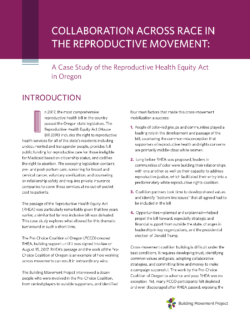Mar
19
2020
We are pleased to announce the release of our most recent publication, Collaboration Across Race in the Reproductive Movement: A Case Study of the Reproductive Health Equity Act in Oregon, which focuses on the successful passage of the 2017 Reproductive Healthy Equity Act (RHEA) and the cross-movement building efforts that made it possible.
Recognized as one of the most thorough reproductive justice bills in the nation, RHEA expanded health coverage for Oregonians to access abortion services, contraception, screenings for STIs and pregnancy, pre- and post-natal care, reproductive cancer screenings and treatment, and more. It also provides coverage for undocumented and transgender individuals to seek the care they need and deserve.
This case study looks at how expanding a white dominant reproductive rights coalition to include people of color groups led to the success of RHEA, expanding its base of supporters. The Pro-Choice Coalition of Oregon (PCCO), a statewide group of organizations working on reproductive rights and equity, created and supported the bill, after a significant change to its organizational makeup. With the help of the national group, All* Above All, the Western States Center brought together people of color led groups to discuss reproductive justice and share the needs in their communities. The Pro-Choice Coalition asked some of the people of color leaders to join PCCO, leading to a difficult period of integrating the voices, expertise, and needs of communities of color into the existing reproductive rights agenda. The development of RHEA was a result of working through and continuing to address these tensions, at the same time that it expanded the base of active supporters – especially people of color – for reproductive health in the state.
For the Oregon case study, we interviewed a dozen participants ranging from the Pro-Choice Coalition steering committee members to outside supporters, and identified four key factors that led to RHEA’s success: 1) the leadership of people of color-led groups and communities; 2) the long-standing relationship building work of leaders of color prior to joining PCCO; 3) the development within PCCO of shared values and issues; and 4) planned and unplanned opportunities that bolstered the coalition as a whole. To learn more about RHEA, the specific challenges and successes of the Pro-Choice Coalition of Oregon, and the importance of cross-movement building work, download and read our full case study here.

